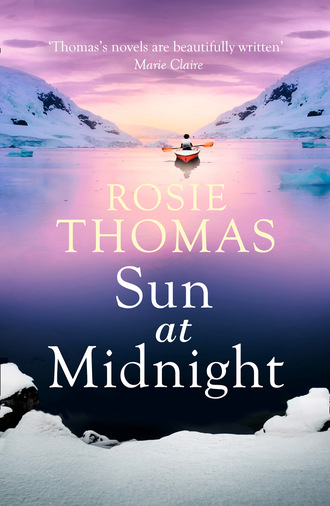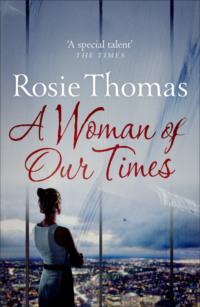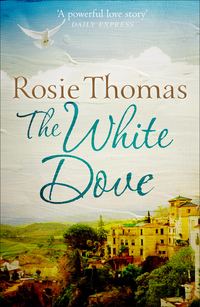
Полная версия
Sun at Midnight
At the bottom of the list there was a new name: ‘Peel’.
Laure and Jochen followed suit. Jochen picked up a radio from the shelf next to the whiteboard. ‘TBC’ on the board indicated that they would need return transport, time to be confirmed by radio link.
‘You’ll be back, Rooker, to make the pick-up from the ship?’ Richard reminded him. The two scientists, heavy with packs and boots and outer clothes, were clumping out of the door.
‘Barring accidents,’ Rook said flatly and followed them.
Niki whistled softly as he tipped potatoes into a pan.
Thick black clouds had massed right across the sky. The snow was now the same luminous pearl as Laure’s ear studs, and it looked almost as smooth. Ridges and hollows were robbed of their contours and the wind was whipping an opaque shroud off the soft surface, making Rook frown through his goggles and lean forward in concentration as he brought the skidoo round. Ducking their heads against the stinging air, Laure and Jochen piled their rucksacks into the rear pannier and Laure climbed on behind Rook. He felt her slither along the seat, and the light pressure of her hips and thighs closing against his as Jochen swung on the back. The skidoo settled under their weight. Rook checked over his shoulder. He twisted the throttle grip so they surged forward, and he felt Laure pressing closer still as her arms fastened round his waist. She dipped her head behind the shelter of his back to keep the wind out of her face, resting her cheek against his spine.
‘Hold tight, won’t you?’ The touch of warning sarcasm was wasted as the wind tore the words out of his mouth and hurled them away.
They had made the fifteen-minute journey to the Adélie penguin rookery several times before. Rook accelerated, with tiny snowflakes driving pinpricks into the narrow band of skin left exposed between his goggles and hood.
The Adélie colony consisted of more than a thousand breeding pairs. The males had come ashore first, hopping and sliding on their long journey from the outer margins of the ice where they had spent the winter, all of them heading for the exposed rocks where a nest of stones could be built. The females had followed them for the brief mating season, and their pairs of eggs would soon be deposited amongst the stones. Rook stopped the skidoo a hundred yards short of the rocks, and first Jochen and then Laure dismounted. Jochen shouldered his bag but Rook hoisted Laure’s and carried it for her. It was extremely heavy, he noted. She gave him a quick smile of gratitude from under the peak of her parka hood.
As they crested the rise, the noise of the rookery burst on them. It was a solid and constant chorus of guttural chirring. The rocks seethed with a black-and-white tide as late arrivals searched for last year’s mates or for new partners, and new nest builders tried to thieve stones from established pairs. There was a flurry of flippers and beaks everywhere, covering every inch of rock. The smell was as powerful as the noise. It was a piquant mixture of fish and oil and guano, and it permeated the clothes and hair and even the skin of anyone who ventured near. One night at the base, after a day’s work at the rookery, Laure had buried her face in her gloves and exclaimed ‘Parfum de pingouin’ with as much delight as if it were Chanel No. 5. She loved everything about penguins and Rook liked her for that. He could hardly distinguish what the other scientists specialised in. Especially Shoesmith. Shoesmith was the most bloodless man he had ever met. He sat over his papers as impassively as if he were carved out of wax.
Rook carried Laure’s pack to the point a few yards from the colony’s edge where a hump in the snow made a small vantage point. He was happy to help her, but he also liked seeing the penguins. There was a whole miniature universe of greed and ambition and devotion and determination crowded on this expanse of rock at the bottom of the world.
As he watched, one bird turned its back on its perfunctory nest, and instantly two rivals filched a stone apiece and dropped them into their adjacent nests. The original owner turned back and made a threatening flurry in each direction, beak wide with outrage. As Rook stood there, three apparently unmated birds marched across the snow to investigate him. They came fearlessly up to the toes of his boots, then stood with their flippers slightly akimbo. They turned their heads to gaze at him, their white-ringed eyes unblinking. After a minute one of them sank down on to its front as if exhausted by the effort of curiosity.
Laure and Jochen unpacked the equipment. At this stage the task was to map the nest sites and ring-mark some of the birds. Later in the season, once the chicks were hatched and established, Laure would take feather and blood samples from her ringed birds for DNA analysis back in Paris. One of her studies, Rook had learned, related to the amount of heavy metals and toxic elements accumulated in the birds’ feathers. The annual accumulation of pollutants could be measured and so provide a precise bio-indicator of new pollution levels on the subcontinent.
This was the gist of what she had told him one night at dinner, in her perfect English. In spite of himself he was interested. To emphasise something about penguin behaviour that particularly intrigued her she would rest her hand lightly on his arm.
It had become accepted that everyone sat in the same places every night, so now Laure was always on his right and Phil on his left. Shoesmith presided at the table’s head, of course.
Laure had her net. She made a quiet circuit past the nests of birds she had already marked, then deftly swooped on a bird quietly sitting with its back to her. Once it was netted, she slipped a hood over its head. The extinguishing of daylight fooled it into lying still, she had explained to Rook, and she could either ring its leg or fire a microchip into a flipper. Jochen followed behind her, an eager assistant, and they moved deeper into the penguin universe.
Rooker would have liked to stay longer out here, watching the birds, but there was the ship and the new arrival. Of course, Russ or Shoesmith himself could have taken the Zodiac out, but whereas Shoesmith was flexible with the other members of the expedition he seemed to expect Rooker to do everything that fell within his area of responsibility, without assistance from anyone else. So he checked the radio link with Jochen and then left them to their work.
As he came over the headland, Rooker saw the supply ship already gliding towards the mouth of the bay. It was only a small cargo vessel with an ugly high prow and a squat bridge tower, but it looked huge against the black water and the white-draped cliffs. The cabin and mast lights made a glittering garland in so much emptiness.
The sea was getting choppy in the wind, with ice rattling and churning in the swell. It wouldn’t be an easy journey in the inflatable. It would have been much better if the ship could have come closer in to shore, but the bay was too shallow. It was one of the reasons why the British had withdrawn from Kandahar. There was no deep-water landing in the summer season, and in winter the sea froze and the base became inaccessible by ship.
Either he made the pick-up right now, Rook thought, or the new arrival would have to stay on the ship until after the storm.
As he passed the radio room at one end of the lab hut he heard Niki’s voice.
‘MV Polar Star, MV Polar Star, this is Kandahar Station. Do you read me? Over.’
The laconic voice of the ship’s radio op crackled back. Rook waited until Niki pushed his headset aside and gave him the thumbs up.
‘The lady waits for you.’
Rook tramped to the main hut and exchanged his parka for a huge orange float suit. To fall into these ice-bound waters without protection would mean death within minutes. As he zipped himself in he saw that the table was laid for tea with Russell’s fresh loaf, jam and a plate of chocolate cupcakes. Shoesmith was hovering nearby while Russ and Arturo, the precise little Spanish climatologist, pulled on chest-high waders.
‘We’ll give you a hand, mate,’ Russ said.
Rooker took a spare life-vest. The three of them scrambled down the rocks to the shingle beach and ran over the jumble of ice and snow to the floating jetty where the Zodiac was tethered. It strained against the moorings as waves smashed around it. With Rook aboard, Russ and Arturo waited for a lull, then rushed the black inflatable out into waist-deep water. Rook lowered the outboard and to his relief it fired at the first pull. He was already broadside to the waves racing into the bay. A big one rushed at him and almost tipped the Zodiac over. He brought the boat round into the wind and opened the throttle. The inflatable roared forward, the prow lifting as high as his head as it breasted the waves, and ice and scudding water punched the rubber floor as he headed for the bay mouth.
The air was thick with spray and sea mist and gouts of snow. He turned on the powerful lamp he had brought with him and scanned the mass of heaving water for the ship. He caught sight of the masts pitching in the distance and drove steadily towards the lights.
Конец ознакомительного фрагмента.
Текст предоставлен ООО «ЛитРес».
Прочитайте эту книгу целиком, купив полную легальную версию на ЛитРес.
Безопасно оплатить книгу можно банковской картой Visa, MasterCard, Maestro, со счета мобильного телефона, с платежного терминала, в салоне МТС или Связной, через PayPal, WebMoney, Яндекс.Деньги, QIWI Кошелек, бонусными картами или другим удобным Вам способом.









